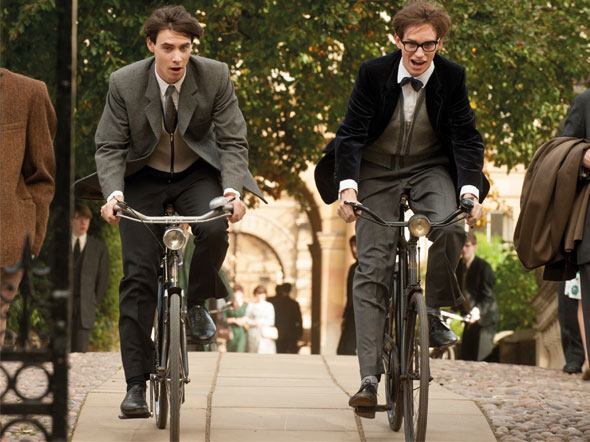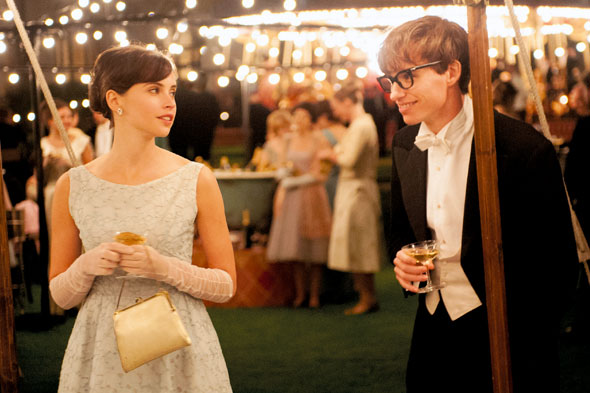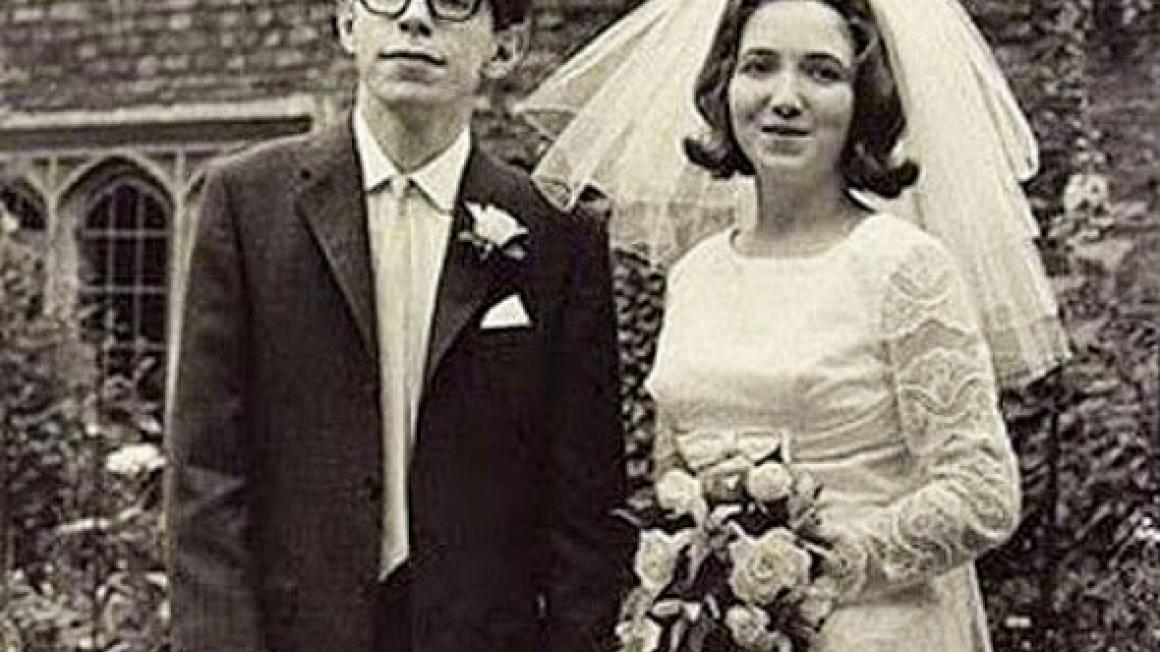The PHYSICS of LOVE
The couple met at Cambridge University. They went on to marry in 1965, Jane aged just 21, and had three children together: Robert, Lucy and Timothy. Stephen had been diagnosed with motor neurone disease shortly after they began dating. He was given just two years to live, but against all the odds went on to revolutionise our understanding of theoretical physics and cosmology, and is still alive today, aged 72.
Stephen has said that his engagement to Jane gave him ‘something to live for’ and that he wouldn’t have been able to achieve what he has without her help.
Jane, however, is rather modest about this high praise. ‘Well, it’s very kind of him if he has said that. My only aim in life actually was just to make things possible for him,’ she tells me.
‘He was in such a pathetic state when the motor neurone disease [a progressive condition that attacks nerve cells in the brain and spinal cord] was diagnosed and we were just beginning to go out together. I just wanted to devote myself to him, make a home for him and make it possible for him to carry on and hopefully have children.’
She told the story of their extraordinary relationship, which sadly ended in divorce in 1995, in her 2008 book Travelling To Infinity: My Life With Stephen. And it has now been dramatised in a new film, The Theory Of Everything, starring Eddie Redmayne as Stephen and Felicity Jones as Jane.
‘It was a great struggle, I have to say, and that doesn’t really come over in the film, but somehow it worked.’
 Eddie Redmayne with Harry Lloyd in the film
Eddie Redmayne with Harry Lloyd in the filmSo does she agree that he could not have done it without her? ‘I can’t judge, can I? No, of course I can’t. I don’t know what would have happened if I hadn’t been there. There might have been somebody else.’
Jane certainly comes over as a woman of faith. ‘Faith that what I was doing was right and that my faith and my mum, because she was a very dedicated churchgoer, would keep me going somehow. It was just one of the rocks I held on to. Without it I think I would have gone off the rails. I just felt I had to do my best. I tried.
‘I had two main reasons for writing the book,’ she continues. ‘One of them was that I had this huge burden of memories, and I thought – and I still believe – that they were really important memories and nobody else knew them like I knew them. If I wanted to be able to get on with my life I just had to write them all down. And there is no point in writing something down and going to all those lengths if you don’t publish it. I’ve unburdened myself.
‘The other reason was that I really wanted to draw attention to what a hard time disabled people, victims of illness, disease or accidents, and their families all have. I don’t know whether it’s hit its target in that respect. I think as far as the medical profession is concerned, quite a lot of people have read it, but as far as politicians are concerned, it’s fallen on deaf ears, because what are they cutting? They are cutting grants to disabled people and they’re closing down Remploy, the organisation that supports jobs for disabled people. That just makes me so angry.’

What does she think of the new film adaptation? ‘We were blown away,’ she says. ‘Stephen really liked it, although it reduced him to tears. It was emotional for all three of us [Jonathan Hellyer Jones, her second husband, Stephen and her]. It really was cathartic, actually, to see ourselves portrayed on film. It was an unreal experience, like stepping out of the real world into a time warp.
‘I have my grumbles about it – a lot of things are mixed up time-wise, scientific events are concertinaed, characters are conflated – but then they explained to me that they had to do that, because how else do you squeeze 25 years into two hours? So that’s the rationale behind it.’
And what of Eddie Redmayne and Felicity Jones? ‘Amazing. Eddie was made up to look like Stephen, but on one occasion I went up to him and said, “Look, Eddie, you’re much too tidy”, and ruffled his hair to make him look a bit more untidy,’ she laughs.
‘He’s done a huge amount of homework, been into hospitals and watched motor neurone patients, and he spent a lot of time with Stephen. Honestly, if you could see them side by side all those years ago you would scarcely know which was which.
‘As for Felicity,’ she continues, ‘we are about the same size, more or less the same colouring and build, so standing side by side, people would say, “Oh, I don’t know which is which.” When I saw her on film, I just gasped; I just thought “She’s me”. She captured my speech pattern, my mannerisms… It was like my person had been taken out of the seat in the cinema and put on the screen; I didn’t know where I was, which was me! It was very strange. I think she plays the part beautifully.’
 Felicity Jones and Eddie Redmayne as Jane and Stephen Hawking in The Theory Of Everything
Felicity Jones and Eddie Redmayne as Jane and Stephen Hawking in The Theory Of EverythingThe film shows that Jane and Stephen’s marriage could on occasion be traumatic. ‘The film depicts his illness in Geneva, when he was on a life-support machine, but we had many incidents before that. From 1976 we had many incidents of him falling ill, having to go into hospital, intensive care, and it was particularly traumatic because of the terrible choking fits he had. Every mealtime was accompanied by these choking fits, which would make the windows rattle. They were absolutely terrifying.’
Despite this, Stephen was reluctant to talk about his illness. ‘I felt that we had to be open with each other about things that were happening and plans for the future, but he would just clam up, almost as if I were insulting him by bringing up the subject. That was very difficult,’ she admits.
When the marriage eventually broke down after 25 years (Stephen left her for one of his nurses, Elaine Mason, in 1990, divorcing Jane in 1995) Jane says it was ‘very traumatic. Very, very traumatic. I had devoted myself to the marriage and the marriage was my reason for being. When it all collapsed I felt that the rug had been pulled from under my feet.
‘But on the other hand, I was in an impossible situation, because I was so exhausted. I couldn’t have gone on, and Jonathan [who helped her to care for Stephen and whom she married in 1997] just appeared like a gift from heaven. It was with his help that I could keep it going. But it seemed that was not good enough in the long term.’

I ask her whether she feels that, in the end, it was for the best. ‘I wouldn’t like to say to be honest.’
What is their relationship like now? ‘We live quite close, so when the children come to Cambridge they can go to see him, and I go to see him once a week on my way into town. From time to time we have a family dinner party, so we are pretty close.
‘I’m very firmly of the opinion that families should stick together, and it’s very important to me that my children and grandchildren communicate and are in touch with each other, which they are, and it may be partly to do with Stephen that they are so close.’
Despite remarrying, she is still known as Jane Hawking. Why? ‘To be honest, that’s the most convenient thing for me to be,’ she says. ‘Once you get to a certain age – and I’m terribly old – you don’t know where to begin when changing it. When I consider it, I think, “Oh my goodness, I just haven’t got time to go through all of that.”
‘When I’m doing things with Jonathan, I’m Hellyer Jones. Professionally, both of my university degrees are in the name of Hawking, and my children were all Hawking, so it’s really just more convenient. And Jonathan doesn’t mind, which is the big thing.’
Although this may not be the conventional Hollywood ending we are used to seeing on film, does she believe that it is still, in fact, a happy conclusion? ‘Oh yes. It took a long time to reconcile ourselves to the changing situation, but the answer is yes from my point of view.’
The Theory Of Everything is on general release from New Year’s Day.


